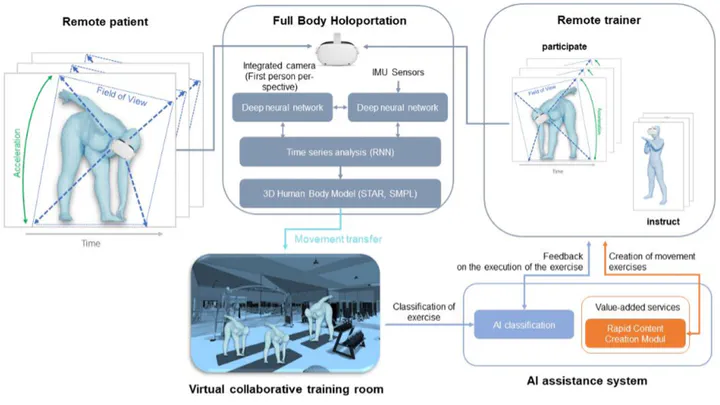Exploring the Potential of Virtual Reality and Artificial Intelligence in Physical Rehabilitation: Benefits, Challenges, and a Tailored Application Design
May 30, 2025· ,,,,·
0 min read
,,,,·
0 min read
Nanna Dahlem
Prakash Naikade
Laura Steffny
Kevin Gisa
Karolin Theilmann
Dirk Werth

Abstract
There is an increasing demand for medical rehabilitation, for both aftercare and prevention. At the same time, the medical sector is facing a growing shortage of health professionals, leading to gaps in medical care. Especially in rural areas, access to qualified rehabilitation therapy is deteriorating. Digital rehabilitation applications offer a solution by enabling location-independent therapy. Virtual Reality (VR) has shown great potential in this area but faces significant challenges. Applications need to be adapted to the unique requirements of rehabilitation therapy. This paper highlights the need for controlled, virtual physical rehabilitation as well as technical and user-related challenges involved. A comprehensive concept is presented that combines VR with Artificial Intelligence (AI) to realize location-independent physical rehabilitation and preserve the benefits of traditional rehabilitation. Since particularly collaborative rehabilitation has been proven to be crucial for achieving positive group dynamic effects, the proposed concept ensures that this aspect is carefully maintained when transitioning rehabilitation to the virtual world. The concept integrates automated support in form of an AI-based supervisor detecting incorrectly performed exercises. Initial results on a dataset collected solely for rehabilitation sports exercises show that the AI for Human Activity Recognition (HAR) is able to reliably recognize these exercises with over 90% accuracy.
Type
Publication
International Conference on Human-Computer Interaction